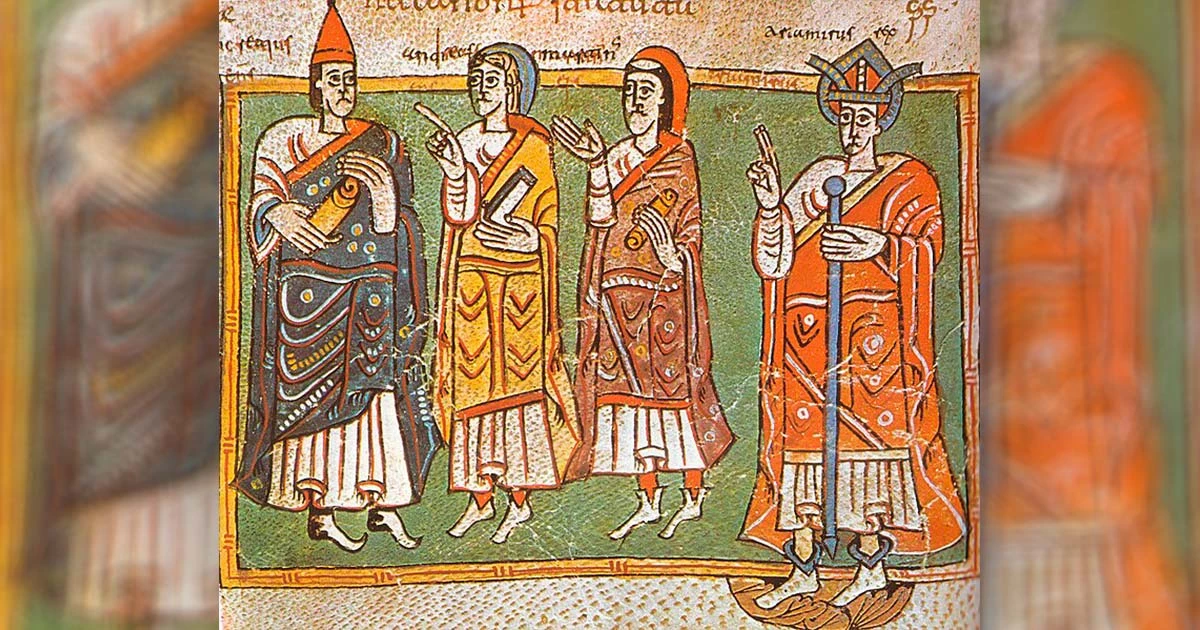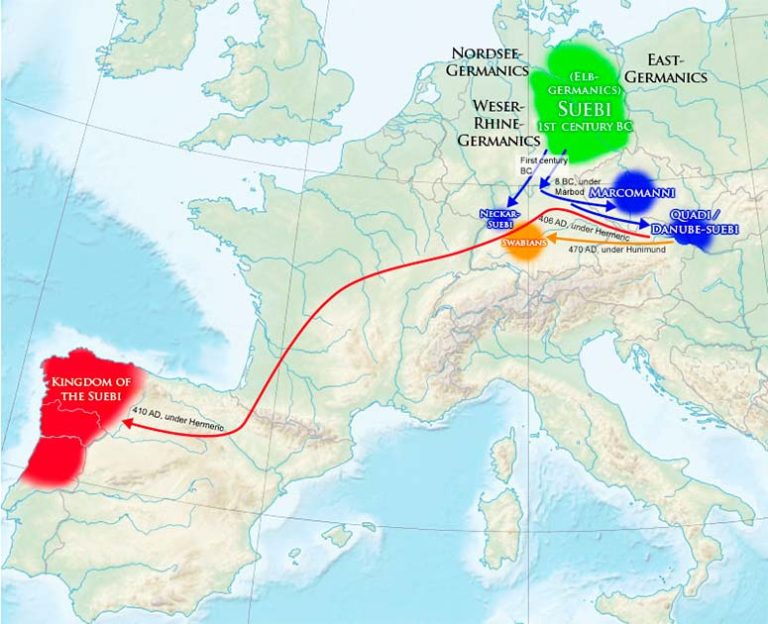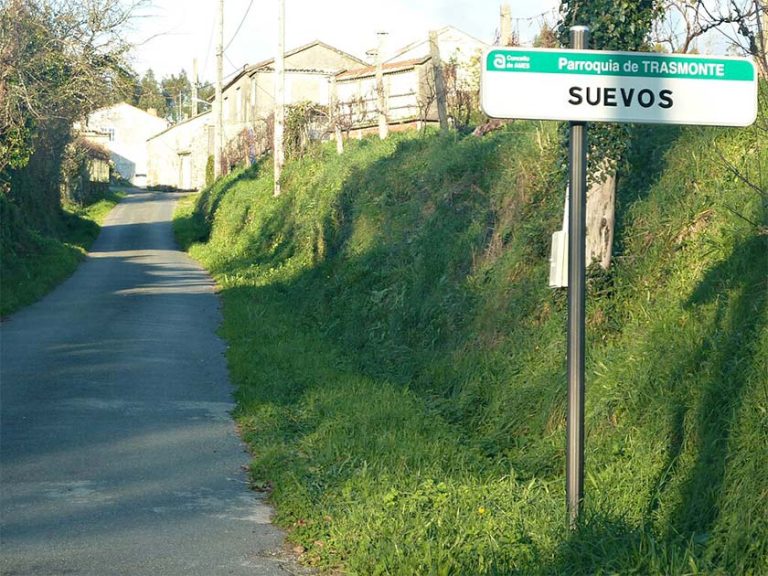The Kingdom of the Suebi: A Germanic Kingdom in Portugal?
 The Kingdom of the Suebi also referred to as Kingdom of Galicia was a kingdom that sprung up after the fall of the Roman Empire. One of the first to separate from the dying Roman system, it was based on the Roman provinces of Gallaecia and Northern Lusitania.
The Kingdom of the Suebi also referred to as Kingdom of Galicia was a kingdom that sprung up after the fall of the Roman Empire. One of the first to separate from the dying Roman system, it was based on the Roman provinces of Gallaecia and Northern Lusitania.
Created by the Suebi in around 409, the peak of the kingdom came in the 6th century until its annexation by the Visigoths in 585. But how did a bunch of Germanic people come to found a kingdom in Iberia, and what happened to it?
The Origins of the Kingdom
There is little known about the tribe of Suebi’s origin. It is thought that they crossed the Rhine on the 31st of December in 406 AD and became a part of the Roman Empire.
It has been speculated that these people were the same as the group referred to as the Quadi, a people who lived in modern-day Austria to the North of the Danube. The Quadi played an important role in the conflict of the 2nd Century Germanic Wars when they fought against the Romans commanded by Marcus Aurelius.
It is thought that the Suebi and the Quadi are the same people or at least descended from the same people due to a letter from St. Jerome which indicates the Quadi as crossing the Rhine and not the Suebi. Regardless, they are known to have crossed the border into the Roman Empire on the evening of 31st December 405 along with the Alans and the Vandals.
Their entrance coincided with a period of Roman history that eventually saw the Roman West fall to a series of invasions and civil wars. Italy itself was invaded by the Goths under Radagaisus which forced the Roman Empire to look inward leaving the door open to other groups.
- The Govan Stones and Glasgow’s Lost Kingdom
- Stilicho: The Man who could have Saved Rome
The Roman Civil War between Constantine and Gerontius in 409 AD left the mountain passes through the Pyrenees neglected. Whether this was on purpose or not, this left southern Gaul and the entire Iberian Peninsula open to attack.

It has been recorded in written sources that in 409 multiple groups of Vandals, Alans and the Suebi travelled through the Pyrenees passes through September and October. When they arrived on the other side, into Hispania, it was recorded that the soldiers entered a frenzy of plunder, looting, and destruction. It was so bad that one contemporary writer, Hydatius, claimed that it caused a famine that resulted in the locals resorting to cannibalism.
In 411, the various groups, the Vandals, the Alans, and the Suebi brokered a peace treaty in which they divided the land of Hispania into allotments of land. Unfortunately, there is no concrete evidence of this treaty, so it is hard to know how it came about or what this looked like in practicality.
Early Kingdom
One of the earliest recorded Kings of the new Kingdom of Suebi was King Hermeric. He was king from 419 until 438. He participated in the Battle of the Nerbasius mountains in which, with the help of the Roman Empire, he was left in control of a territory that was in the whole northwestern province.
In 438, Hermeric became ill. He had annexed the entire former Roman province of Gallaecia and made peace with the local population. Due to his ongoing health, he retired and left his son, Rechila, as King.
Rechila began an aggressive expansion of his territories and pushed the boundaries of his kingdom across the Iberian Peninsula. Rechila defeated the Romans in Baetica, and the Alans in Lusitania and continued to expand. By 441, the armies of Rechila conquered Seville.
- Mercia: Lost Great Kingdom of the Britons
- The Merovingians: Were these Dark Age Kings descended from Christ?
In 446, the Romans dispatched a Magister named Vitus to subdue the Suebi along with an army of Goths. Rechila marched to meet them and defeated them all. Vitus fled in disgrace and the Romans did not attempt to take over the peninsula again. In 448, Rechila died, ushering in a brief moment of peace with an ordered succession of kings, father to son.
Between the years of 470 and 550, little is known about the kingdom. According to Isidore of Seville writing in the 7th century, the kings of Suebi were all Arians. One king is mentioned named Theodemund but there is little else known about him. There is a trustworthy source found on a stone inscription in Portugal which recorded the foundation of a church by King Veremund.
Legacy of the Suebi
While the Suebi were known to have adopted the local “Vulgar” Latin, they left behind their Germanic tongue and did not adopt the native Portuguese languages. Thus, it has been difficult to distinguish Gothic and Suebic words.
One place that their influence can be seen is through local toponymy and anthroponym. Personal names that were used by the Suebi were in use until the Low Middle Ages. Across Portugal and Galicia, there are several thousand place names derived directly from a Germanic source.

Another group of toponyms that indicate old Germanic settlements are the places named Sa, Saa, Sas, in Galicia, or Sá in Portugal, all of which derived from the Germanic word sal- which can be translated to ‘house, hall’. It is found and distributed mostly around Braga, Porto, and in the Minho River valley in Portugal, and all around Lugo in Galicia, totalling a few hundred.
In modern Galicia and Spain, there are four parishes and six towns and villages which are still named Suevos or Suegos, from the medieval form of Suevos, all of them can be seen derived from the Latin Sueuos ‘Sueves’, and referring to old Suevi settlements which can still be visited today. Despite the distance between these settlements in time, the lasting impact of the Suebi kingdom is still present.
